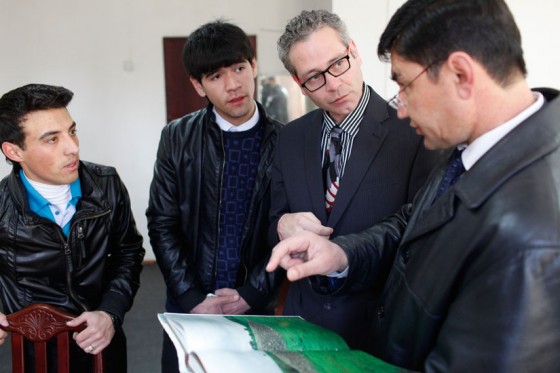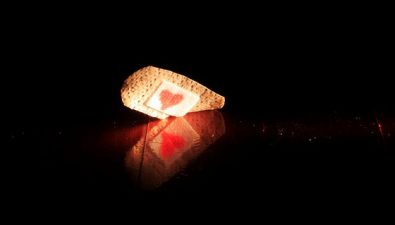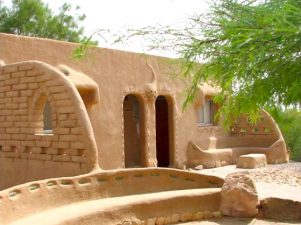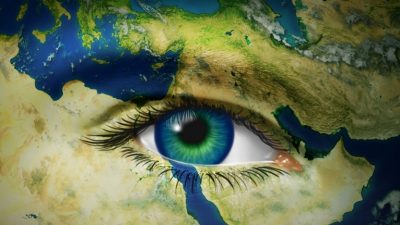
Live long enough and we all know heartbreak, but what happens when a well-loved sustainable project walks away?
Looking for day trips to explore modern Middle East architecture, I stumbled across Jordan’s The Aqaba House (TAH). This ambitious little house was the first modern home fully based on green building principles specific to its Aqaba location. Oriented to capitalize on sun exposure, with purposeful shading, its terraces offered fantastic views overlooking Aqaba and Eilat across the Red Sea. Recycled graywater irrigated the local flora filling its gardens. Solar thermal heated its water and air conditioning ran on solar electricity. A decent alternative to Aqaba’s swanky resorts, I was ready to pack my toothbrush. The only catch was it closed two years ago.
I learned the sad news after a friendly Dutch guy named Theo answered my emails to their website, explaining some of the backstory. It got me wondering about the people behind these sensitive, small eco-projects. What happens when their hard work and dedication is dashed by economic or political hiccups?
Meet Theo van de Laar, Middle East tour guide and the guy behind the Aqaba House:
Green Prophet: Holland to Jordan, didn’t you like tulips?
Theo: Yeah, I’m from the Netherlands. I studied history and after a few post-grad years working in marketing, I decided a traditional office job wasn’t for me. I applied for work as a tour leader, got hired and was sent to Egypt for three months. That was in 1999 and I’ve been on the road ever since.
After three years working in the Middle East, I wanted to experience actually living in the region and in 2002, I moved to Beirut. Lebanon was my base, but I worked as a tour guide to Sri Lanka and Morocco and to everywhere in between. At one point I was hired to guide academic tours to Jordan. That’s how I met Florentine Visser, the architect for TAH, who turned out to be from my Holland hometown. When she asked if I’d be interested in running the place, I jumped at the challenge.
I’ve always behaved in an eco-friendly way. I’ve never owned a car; I’ve recycled paper and glass even in the most remote places. But to me, this house was less about sustainable technology and more about turning traditional tourism on its head.
So, spill the beans on The Aqaba House.
TAH was a pilot project to demonstrate eco-friendly building in a hot, dry climate. Designed as a private home (called the Aqaba Residence Energy Efficiency), EU underwriting required that the premises be open to the public for at least one year. So it was reborn as a guesthouse called TAH. Through the architect, I was asked to devise a plan for exploiting the house’s unique qualities. A few months after its official opening in 2009, I moved to Aqaba.
Unfortunately, financial support immediately got wobbly, promised cash didn’t materialize. At that point I probably should’ve turned around, but I didn’t. I totally believed in this project.
I staged a lot of activities and TAH became a “happening” point in Aqaba’s art scene. I managed the personnel, organized the events, did the marketing and ran the B&B and art gallery for almost a year. The house attracted publicity and visitors, however relations with its owners became problematic. Within a year its doors closed to the public.
I’m glad I was given the chance to run that special project. It was presented as “good living made sustainable,” and that slogan that had a lot of truth in it.
So when those doors closed, did others open?
After Aqaba, I returned to guiding tours throughout Jordan. Together with winemaker Omar Zumot, I worked to set up an eco-friendly tourist stopover in northern Jordan. In 2010, new project development was stalled by regional unrest in Egypt and Libya, and tourism in general was slack, so I returned to Holland.
I consulted with Volunteer Services Overseas (VSO), an international development organization that sends volunteers abroad, and did a lot of travel writing. Eventually I got back into guiding tours through Jordan, Ethiopia, Georgia and Armenia. My clients tend to be Dutch and Belgian: I conduct my tours in English, Dutch and French.
What are you doing now?
Last October, as a VSO volunteer, I traveled to Dushanbe, in the Central Asian republic of Tajikistan, where I now work as a teacher and consultant at a local university. Land-locked Tajikistan’s the third least-visited country in the world. Tourism could, in a pretty sustainable way, make an enormous difference in this nation’s development.
 My job is to act as an agent of change: open the windows to the 21st century and to build capacity in both students and teachers to support Tajikistan’s tourism industry.
My job is to act as an agent of change: open the windows to the 21st century and to build capacity in both students and teachers to support Tajikistan’s tourism industry.
I organize ‘master classes’ for teachers and students, inviting 3rd party lecturers and establishing relations with other, relevant organizations in and outside of the country.
I’m deeply honored to have had a chance to work here, but at the same time I have to admit that I’m starting to miss my old life and touring work.
Partly, that’s because of the volunteer-life: sharing a house with 3 (and sometimes 4) others on a very limited income is challenging, especially in the relatively expensive capital city of Dushanbe.
On the other hand, Dushanbe is a very attractive city, and Tajikistan is absolutely worth a visit.
But political rest knows no boundaries. Civil conflict in the mountainous southeastern region of Tajikistan is undermining Tajikistan’s potential as a tourist destination.
It’s heartbreaking, because this nation has a lot to offer world travelers. Competition for touristic dollars is steep.
Aqaba to Tajikistan: what’s next?
I’m planning tours to Lebanon, Morocco and trips to Georgia, Armenia and Azerbaijan, all with a culinary focus. I’m heading to Lebanon in mid-October to manage a fully-booked food and wine tour. Food is an excellent way to connect to a culture.
Looking back over my career, I don’t ever seem to do “normal” things. I’m passionate about helping people and places to develop, in maximally sustainable ways, because along the way, I develop myself.
End note: As someone who threw a dart at a university admissions book and hit jackpot with a major that’s seen me happily employed through global upheaval and economic thunderstorms, I’m fascinated by people who recycle their skills, always adding new ones, and reapplying them with passion to new opportunities.
Got a Middle Eastern touristic challenge? Contact Theo through Green Prophet.
All images of Theo with VSO Tajikistan colleagues courtesy of Teodore Kaye




